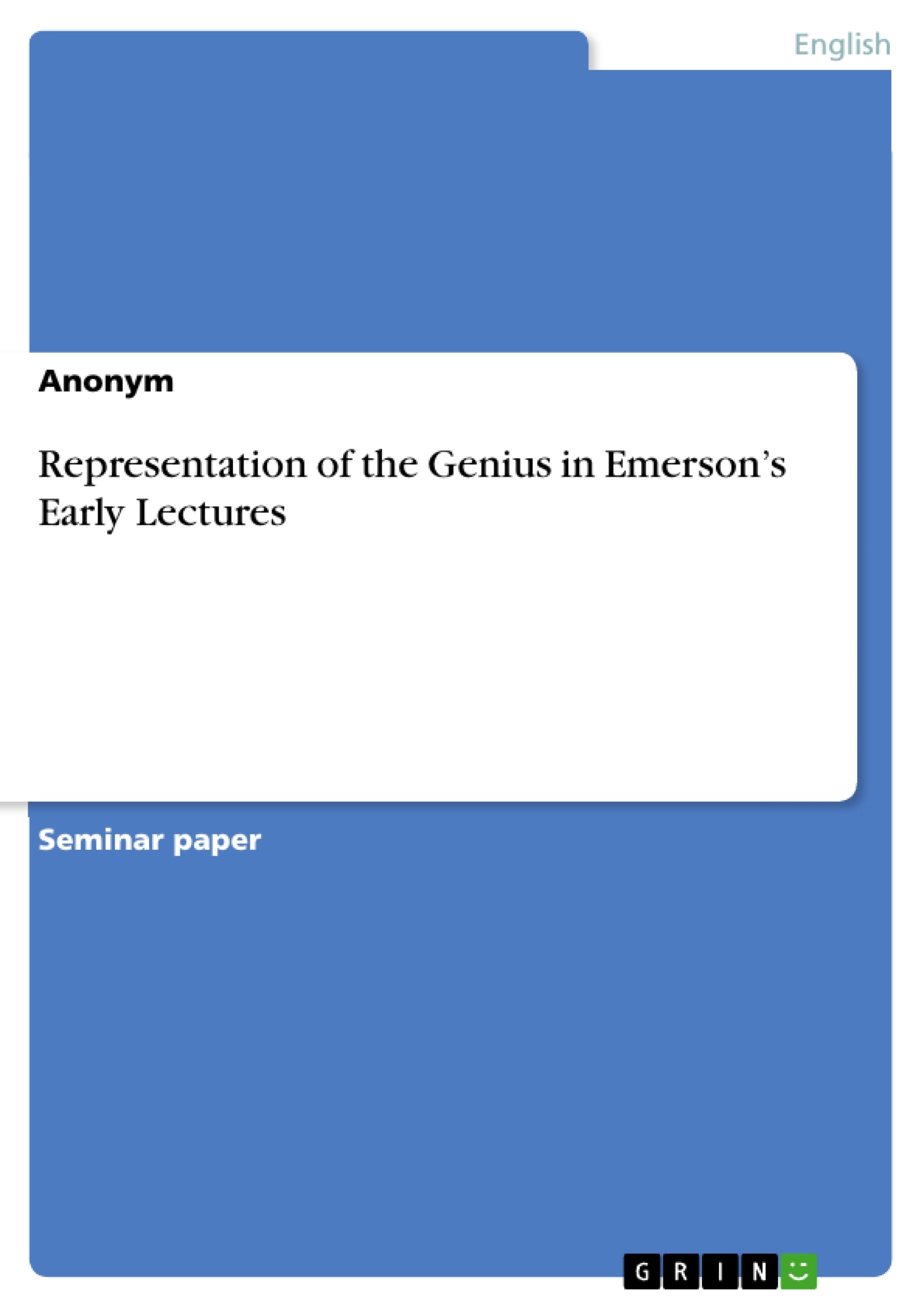Ralph Waldo Emerson (*1803 †1882) was an American poet, essayist, lecturer and philosopher. In his life he shifted his literary focus away from religion and literature as such, as he wanted to think beyond those and provide people with broader thoughts and ideas. His goal was to provide a framework that includes both, literature and religion (Cayton 1992) – which he accomplished. This led him to him being a recognizable national figure "because his message shifted from being heard in religious and literary terms to being heard as discourse pertaining to something else" (Cayton 1992).
His most famous work might be ‘The American Scholar’, a speech which he gave in 1837. It served as a pioneer for American education and culture and presented thoughts and ideas for a ‘new’ American identity, which was at that time still very much influenced by European identities. Through his works and practices Emerson became a role model for ‘Man Thinking’, a concept he himself introduced in ‘The American Scholar’. Man Thinking stands for all the abilities and talents a scholar should achieve by studying culture and nature which eventually lead to an improvement in society. In return the scholar (men) will be happy and find their own truths.
Emerson influenced the 19th century in many ways and eventually "[he] became one of the first symbols of this [American] culture, newly defined as the awareness and mastery of a certain body of knowledge" (Cayton 1992).
Historians have not fully reached common ground to characterise Emerson, as he can take many forms, yet Cayton (1992) describes him as one of the most celebrated American intellectuals. Not only did he shape Puritan beliefs and ranks as the founder of American literary romanticism, but he is also seen as the “prime mover in a generation of reformers” (Cayton 1992) and “people liked him because he did their thinking for them” which can also be seen as an indication for Emerson being a Genius himself.
Inhaltsverzeichnis (Table of Contents)
- Introduction
- Representation of the Genius in Emerson's Early Lectures
- Michelangelo Buonarroti
- Martin Luther
Zielsetzung und Themenschwerpunkte (Objectives and Key Themes)
This text aims to explore the concept of genius in the early lectures of Ralph Waldo Emerson, specifically focusing on his interpretations of figures like Michelangelo Buonarroti and Martin Luther.
- Emerson's definition of "Genius" and its significance in shaping American identity
- The role of creativity, innovation, and self-reliance in defining a Genius
- The relationship between the Genius and societal norms and values
- The influence of Transcendentalism on Emerson's understanding of Genius
- The impact of Emerson's interpretation of Genius on his contemporary audience and its relevance today.
Zusammenfassung der Kapitel (Chapter Summaries)
The introduction provides background information on Ralph Waldo Emerson's life and works, highlighting his shift from religious and literary themes to broader intellectual discourse. It also introduces the concept of "Man Thinking" and its relevance to Emerson's vision for American society.
Chapter 2 delves into Emerson's portrayal of Genius within his early lectures. It sets the stage for analyzing specific individuals whom Emerson considered to embody this concept.
Chapter 2.1 focuses on Emerson's lecture about Michelangelo Buonarroti, exploring Michelangelo's multi-faceted artistic achievements and his ability to express "the Idea of Beauty" in various forms. It also discusses Michelangelo's unconventional approach to art and his modest lifestyle.
Chapter 2.2 examines Emerson's lecture on Martin Luther, emphasizing Luther's role in challenging the authority of the Catholic Church and promoting a more individualistic interpretation of Christian belief. It highlights Luther's emphasis on the Bible as a source of truth and his opposition to papal authority.
Schlüsselwörter (Keywords)
Key terms and concepts explored in this work include: genius, Transcendentalism, American identity, creativity, innovation, self-reliance, societal norms, artistic expression, individuality, Michelangelo Buonarroti, Martin Luther, The American Scholar, Ralph Waldo Emerson's early lectures.
Frequently Asked Questions
How did Ralph Waldo Emerson define a "Genius"?
For Emerson, a Genius is characterized by creativity, innovation, and self-reliance, often acting as a "Man Thinking" who masters knowledge to improve society and find personal truth.
What is the concept of "Man Thinking"?
Introduced in 'The American Scholar', "Man Thinking" refers to a scholar who uses their talents and studies of nature and culture to contribute meaningfully to society rather than just following tradition.
Why did Emerson use Michelangelo as an example of Genius?
Emerson highlighted Michelangelo's ability to express the "Idea of Beauty" across multiple art forms and his unconventional, modest lifestyle as embodiments of artistic genius.
How did Martin Luther fit into Emerson's definition of Genius?
Emerson viewed Luther as a Genius because of his self-reliance in challenging the Catholic Church and promoting individual interpretation of truth through the Bible.
What role did Transcendentalism play in Emerson’s early lectures?
Transcendentalism influenced Emerson's belief in the inherent goodness of people and nature, emphasizing individual intuition and spiritual independence over societal norms.
- Quote paper
- Anonym (Author), 2021, Representation of the Genius in Emerson’s Early Lectures, Munich, GRIN Verlag, https://www.hausarbeiten.de/document/1176187


